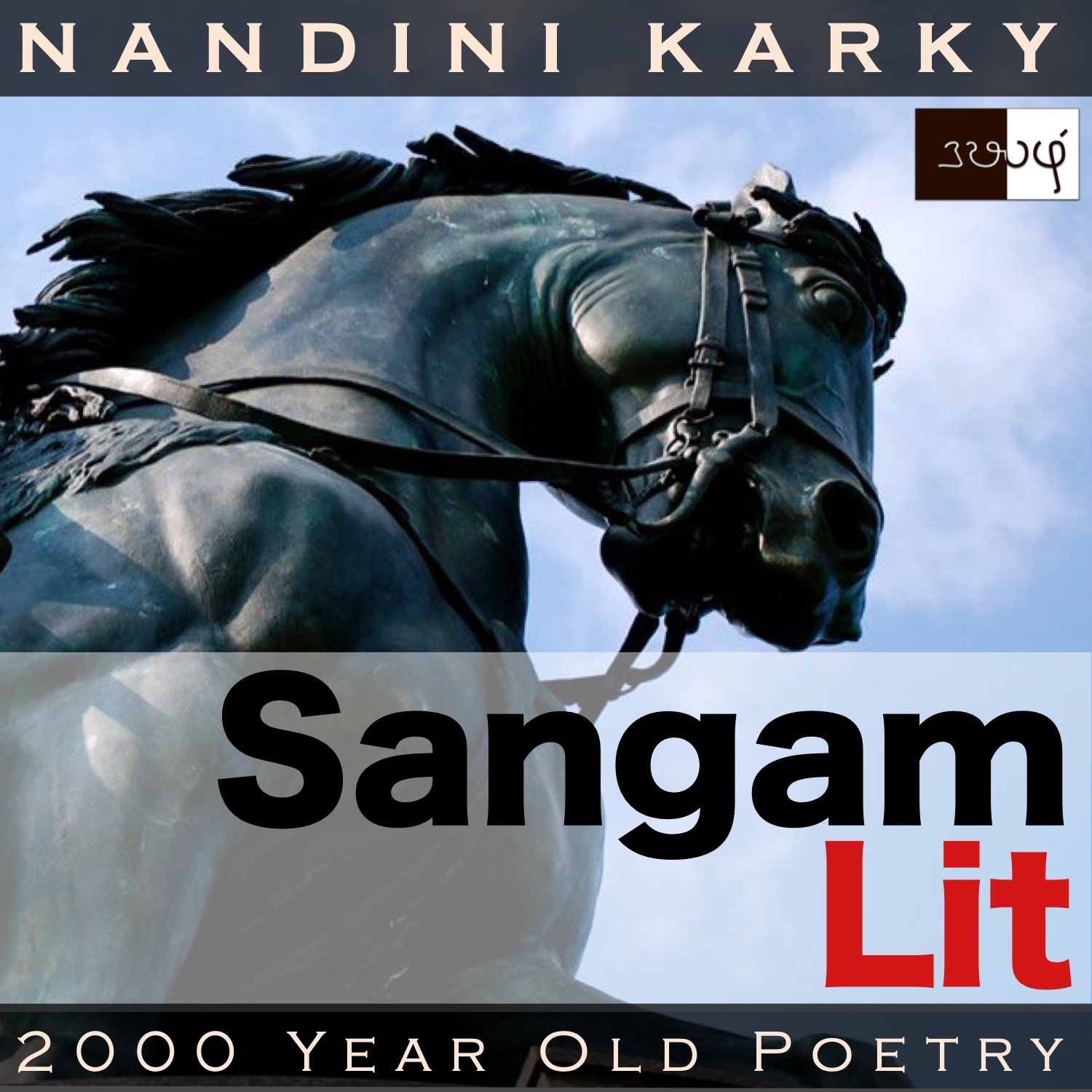Podcast: Play in new window | Download
Subscribe: Apple Podcasts | Spotify | Amazon Music | Android | iHeartRadio | TuneIn | RSS | More

In this episode, we relish the celebration of a man’s homecoming, as portrayed in Sangam Literary work, Natrinai 361, penned by Madurai Peraalavaayar. Set in the forest regions of ‘Mullai’, the verse speaks in the voice of the confidante, in response to the helpers’ worried query about the man’s delay in returning.
சிறு வீ முல்லைப் பெரிது கமழ் அலரி
தானும் சூடினன்; இளைஞரும் மலைந்தனர்;
விசும்பு கடப்பன்ன பொலம் படைக் கலி மா,
படு மழை பொழிந்த தண் நறும் புறவில்,
நெடு நா ஒண் மணி பாடு சிறந்து இசைப்ப,
மாலை மான்ற மணம் மலி வியல் நகர்த்
தந்தன நெடுந்தகை தேரே; என்றும்
அரும் படர் அகல நீக்கி,
விருந்து அயர் விருப்பினள், திருந்துஇழையோளே.
The verse opens with the words ‘சிறு வீ முல்லை’ meaning ‘a small-flowered wild jasmine bush’ and this is contrasted with the next phrase ‘பெரிது கமழ் அலரி’ meaning ‘hugely fragrant bloom’. ‘விசும்பு கடப்பன்ன’ conjures before our eyes that which ‘seems to jump as if it were crossing the skies’ and we learn that this action is done by a ‘பொலம் படைக் கலி மா’ meaning ‘a strong horse, decorated in gold’. The season is highlighted in the words ‘படு மழை பொழிந்த’ meaning ‘a heavy downpour’. A frequently encountered object in Sangam times ‘நெடு நா ஒண் மணி’ meaning ‘the long-tongued clear bell’ makes an appearance here too. The affluence of the household is highlighted in ‘மணம் மலி வியல் நகர்’ meaning ‘the huge mansion, whose yard is filled with copious sand’. ‘நெடுந்தகை தேரே’ refers to the ‘virtuous man’s chariot’ and denotes him with deep respect. Ending with ‘விருந்து அயர் விருப்பினள், திருந்துஇழையோளே’ meaning ‘the woman wearing well-crafted jewels desires to serve a feast’, the verse welcomes us with its innate hospitality!
The man and lady had been leading a happy, married life when the man had to part with the lady to gather wealth. As days pass and the promised season of return nears, the lady’s helpers express their worry to the lady’s confidante. Having heard of the man’s impending arrival through messengers, the confidante says to them, “The much fragrant bloom of the small-flowered ‘mullai’ was worn by the lord and by his attendants too. His proud horse, decorated with gold ornaments, leaped on the cool, fragrant forest path, drenched by a downpour, as if it were crossing the skies. With the sound of the long-tongued clear bells resounding, in the confusing hour of evening, the great lord’s chariot will arrive at the sand-filled yard of our huge mansion. Perceiving that her deep sorrow of loneliness will be wiped away, she desires to serve a feast, that lady with well-crafted jewels!” With these words, the confidante assures the helpers about the man’s return in the promised time, much to the delight of the lady.
Time to delve into the details! The confidante starts her words by bringing into focus, a flower well-known in the region, so much so that it gives its name to that land. A bush with these small ‘mullai’ flowers are seen in full bloom and thickly spreading the air with their fragrance. Then, the confidante says that the man wore those flowers and gave them to his attendants too. This image is intended to highlight how the man had completed his mission and his heart registers the promise he made to the lady about returning by the rainy season, the time when these wild jasmines bloom. To fulfil his promise, he rides his horses, making those gold-decked, valiant animals leap as if they were crossing the skies above. This moment made me feel as if the confidante had taken a camera and placed it under a horse on the ground, recording its run that looks as if it’s riding the skies! The confidante then explains where the horses are, saying it’s on the forest path, drenched in rain. Then, from the horses, the confidante turns to the vehicle being pulled by them and mentions how they will soon bring the lord’s chariot, resounding with bells, back home to the entrance of their huge mansion, that is spread with the finest of sand. I wonder what those mansions were made of, and whether any stood the ravages of time!
After speaking about the man all this while, the confidante turns to talk about the lady, who wears well-crafted ornaments, saying now that her deep pain of being alone is wiped clean, she intends to prepare a feast to welcome her beloved back home. The verse serves to highlight how it was considered the duty of a man to part away and the duty of a woman was to stay home. His lot was to earn wealth and hers was to be hospitable. Such elements of the past are changing everywhere but remnants remain that we can still understand what they mean. But, possibly, someday in the future, these gender divisions of the past will be looked upon with incredulity, much like how we look at our past, to that time when cutting-edge technology was merely, a sharpened stone!




Share your thoughts...